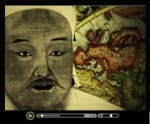Mongol Empire
Mongol Empire – Genghis Khan
The Mongol Empire was founded by Genghis Khan, a Mongol political and military leader who sometimes brutally conquered and united the Mongol tribes. Between AD 1206, when Temujin received his title as Genghis Khan (“Ruler”), and AD 1370, when the last emperor in China’s Yuan Dynasty died in exile, the Mongol “Khagan” (“Great Khans” or “Emperors”) established the largest contiguous empire in world history.
At its height, the Mongol Empire covered large parts of modern-day China, Mongolia, Russia, Azerbaijan, Armenia, Georgia, Iraq, Iran, Turkey, Kazakhstan, Kyrgyzstan, Uzbekistan, Pakistan, Tajikistan, Afghanistan, Turkmenistan, Moldova, South Korea, North Korea, and Kuwait. After the death of Genghis Khan in 1227, the Mongol Empire grew even larger under his son, Tushi, and grandson, Kublai Khan, who established the Yuan Dynasty in China through at least 22 legitimate sons. This family legacy made the Khan’s the most successful empire builders ever.
Mongol Empire – The Silk Road
Once established, the Mongol Empire became a peaceful political environment that allowed increased communication and trade between the West, Middle East, and Asia. This openness meant that these previously separate worlds could begin to trade with each other.
In the late 1200’s, a Venetian explorer named Marco Polo became one of the first Europeans to travel what would later be called “The Silk Road” to China. Polo, together with his father Niccolo and his uncle Maffeo, traveled to China to visit Kublai Khan, the then-ruler of the Mongol Empire. The Silk Road was a series of interconnected trade routes through various regions of the Eurasian continent, mainly connecting China with Asia Minor and the Mediterranean. It extended over 5,000 miles on land and sea, laying the trade foundation for the modern world.
Mongol Empire – The Travels of Marco Polo
After his visit to the Mongol Empire, Marco Polo returned home just in time for a war between the “city states” of Venice and Genoa. Polo fought on the side of his hometown Venice, was captured, and spent some time in a Genoa prison. It was in prison where Marco Polo wrote his famous journals about his travels in Asia. In his writings, he explained that Kublai Khan was delighted with the Polo’s, listened eagerly to all they shared about the Western world, and sent them back as envoys to the Pope. The “Great Khan” wrote letters to the Pope and requested he send a large body of educated men to instruct the Mongol Empire in the ways of the West and Christianity.
Writing of Khan’s request to the Pope, Marco Polo wrote: “His object, he told them, was to make a request to his holiness, that he would send him a hundred men of learning, thoroughly acquainted with the principles of the Christian religion as well as with the seven arts, and qualified to prove to the learned of his dominions, by just and fair argument, that the faith professed by Christians is superior to, and founded on more evident truth than any other, that the gods of the Tartars and the idols worshiped in their house were only evil spirits, and the people of the East in general were in error in reverencing them as divinities.”1
This is a pretty amazing moment in world history. The grandson of Genghis Khan and the leader of the largest empire ever assembled in human history issues an open invitation to the Pope in Rome to come help Westernize and Christianize the remaining known world of the time.
Mongol Empire – A Missed Opportunity for the World
In November of 1268, after three long years of travel, the Polo’s arrived in Rome, letters of Kublai Khan in hand. The only problem is that Pope Clement IV has just died and it would be more than two years before a new Pope was named. And for reasons we don’t completely understand from history, the new Pope, Gregory X, did not fulfill the request from Kublai Khan. Instead, Pope Gregory sent gifts, letters, and two (not 100) well-educated friars back to the Great Khan. However, on their way to China, they fell into a war zone on the outskirts of the shrinking Mongol Empire. Muslim warriors, operating under the Sultan of Egypt, had captured the most important centers of Armenia and were slaughtering the local inhabitants. The Polo’s were a bit more accustomed to the dangers of this trade route, but the friars, fearing for their lives, handed the gifts and letters over to the Polo’s and returned to Rome under escort by the Knights Templar.
Who knows how history could have been altered at this moment in time. The Mongol Empire later fell, China eventually turned to Buddhism, a rising Islamic threat virtually closed the Silk Road, and trade with Europe was restricted to the sea. Finally, in 1452, when Christopher Columbus was a mere lad of one-year-old, Muslim leader and Ottoman Sultan, Mehmed II (aka Mehmet II; aka Mohammed II) conquered Constantinople, the last safe refuge for European trading to the East. From that point on, Western trade with India and China was a very hazardous undertaking because there were no safe havens from Muslim attack and piracy.
Footnotes:
1
The Travels of Marco Polo, The Venetian, Book 1, Chapter 1, as translated by W. Marsden in 1818 and re-edited by Thomas Wright in 1854. A complete copy of this translation is housed at the British Library and available at http://www.china-institut.org/bibliothek/The%20Travels%20of%20Marco
%20Polo.PDF.



